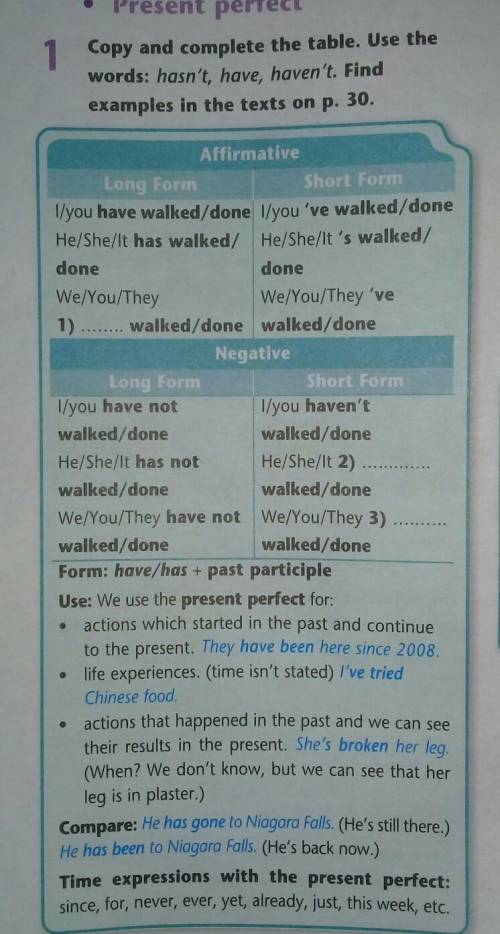Nt pe 3
1 Copy and complete the table. Use the
words: hasn't, have, haven't. Find
examples in the texts on p. 30.
4
F
Affirmative
Long Forn
Short Farm
1/you have walked/done l/you've walked/done
He/She/it has walked/ He/She/It's walked/
done
done
We/You/They
We/You/They've
1) walked/done walked/done
Negative
Long Form
Short Form
V/you have not
1/you haven't
walked/done
walked/done
He/She/It has not He/She/it 2)
walked/done
walked/done
We/You/They have not We/You/They 3)
walked/done
walked/done
Form: have/has + past participle
Use: We use the present perfect for
actions which started in the past and continue
to the present. They have been here since 2008
life experiences. (time isn't stated) I've tried
Chinese food
• actions that happened in the past and we can see
their results in the present. She's broken her leg.
(When? We don't know, but we can see that her
leg is in plaster.)
Compare: He has gone to Niagara Falls (He's still there.)
He has been to Niagara Falls. (He's back now.)
Time expressions with the present perfect:
since, for, never, ever, yet, already, just, this week, etc.

Ответы
Показать ответы (3)
Другие вопросы по теме Английский язык
Популярные вопросы
- - 9 х + 7 х - 5 х + 2 нужно...
1 - Выполните действия и соотнесите с верным ответом...
1 - Даны разложения чисел a и b на простые множители. Найди наименьшее общее кратное...
1 - Тіл туралы мақал- мәтелдерді керекті сөздермен толықтыр. 1. Тіл - адам ойының ....
2 - Оян қазақ мағынасы қандай...
2 - Адміністративно територіальний устрій підавстпійської україни (характеристика ...
1 - Из точки а отец вехал на велосепеде на восток со скоростью 16км/ч а сын на юг со...
3 - Как переводиться слово тюрк? 70-е годы VI века – в момент своей наибольшей территориальной...
2 - На какие фазы делятся остановка мяча ногой...
2 - Task 2. Read and guess (Прочитай и догадайся, какое животное описывают). It’s got...
3